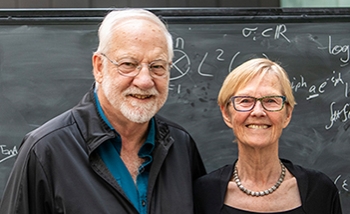Watch the live webcast on this page on Wednesday, March 3 at 7 pm ET.
A hundred years ago, we believed that our own galaxy, the Milky Way, constituted the entire universe. We believed that the universe was stagnant. We did not know about the constituents of the universe – dark matter and dark energy – and we believed that we were special.
At the time, cosmological research relied on Newton’s conceptions of gravity. Since then, discoveries in modern physics, the triumphs of Einstein’s theory of general relativity, and the confluence of these ideas and instruments have completely transformed our understanding of space and time.
Today, we know that the universe is a dynamic and restless place, containing a billion galaxies or more. It is also expanding at an accelerating rate, structured by mysterious invisible components: dark matter, dark energy, and black holes.
Priyamvada Natarajan's research is focused on precisely those exotic components. A professor in the Departments of Astronomy and Physics at Yale University, she is interested in confronting and testing theoretical ideas with observational data in astrophysics. She is noted for seminal contributions to two of the most challenging problems in cosmology – mapping the distribution of dark matter and tracing the growth history of black holes – and her work has enabled concrete predictions for upcoming astrophysics missions, including the James Webb Space Telescope and the Laser Interferometer Space Antenna (LISA).
Natarajan's list of accomplishments is extensive. After becoming the first woman in astrophysics to be elected a fellow of Trinity College, Cambridge, she has served as the Chair of the Division of Astrophysics of the American Physical Society and is also the Director of the Franke Program in Science and the Humanities at Yale, among other roles.
Natarajan is deeply invested in the public understanding of science: she serves on the advisory boards of NOVA ScienceNow, Quanta Magazine, and Scientific American, and her work has been featured in The New York Times, BBC, and CNN, to name just a few. She is also the author of the critically acclaimed book Mapping the Heavens: The Radical Scientific Ideas that Reveal the Cosmos.
In her March 3 Perimeter Public Lecture webcast, Natarajan will guide the audience through what we currently know about the nature of dark matter and black holes.
The Perimeter Institute Public Lecture Series is made possible in part by the support of donors like you. Be part of the equation:
https://insidetheperimeter.ca/donate
About PI
Perimeter Institute is the world’s largest research hub devoted to theoretical physics. The independent Institute was founded in 1999 to foster breakthroughs in the fundamental understanding of our universe, from the smallest particles to the entire cosmos. Research at Perimeter is motivated by the understanding that fundamental science advances human knowledge and catalyzes innovation, and that today’s theoretical physics is tomorrow’s technology. Located in the Region of Waterloo, the not-for-profit Institute is a unique public-private endeavour, including the Governments of Ontario and Canada, that enables cutting-edge research, trains the next generation of scientific pioneers, and shares the power of physics through award-winning educational outreach and public engagement.
You might be interested in


